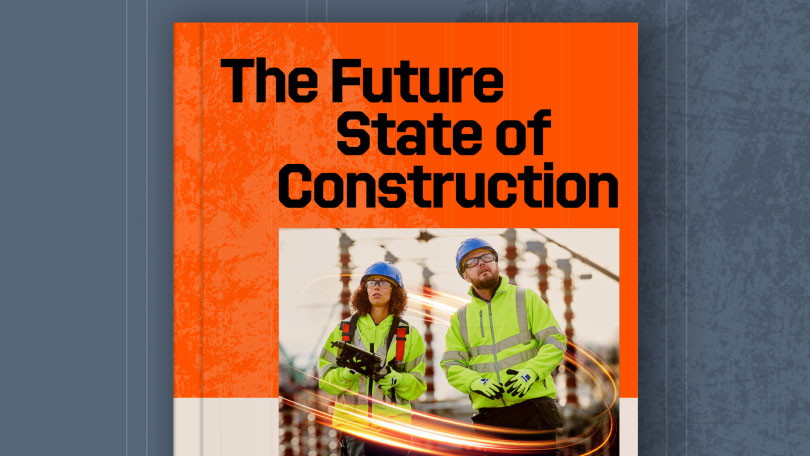— 6 min read
Construction Document Management: The Challenges and Benefits of Embracing a DMS

Last Updated Sep 10, 2025

Sean Doran
Enterprise Solution Specialist
Sean is a Solutions Engineer at Procore with a background in civil engineering and construction management, with over a decade of experience across project management, engineering, and functional consulting. He’s held various site based roles for Multiplex as well as Project Manager at TSA Management and has a deep understanding of cloud-based construction platforms, including Procore. With a passion for solving complex challenges and a commitment to continuous learning, Sean enjoys sharing practical insights to help construction professionals improve processes, embrace innovation, and stay ahead in a rapidly evolving industry.
Last Updated Sep 10, 2025

Every construction project begins, continues, and ends with a mountain of paperwork. From initial bidding documents to contractor agreements, blueprints, variation orders, inspection reports, on and on it goes. And that’s why an effective construction document management system (DMS) is essential – whatever your project.
In essence, construction document management is the process of centralising, storing and controlling every document related to a construction project. It puts the information every stakeholder needs right at their fingertips. It’s out with the old paper chase, and in with the latest updates just a click away.
Table of contents
The Benefits of Implementing a Construction Document Management System
Implementing a construction document management system is a game-changer and can transform how projects are managed. By ensuring proper construction document control, there is the opportunity to eliminate inefficiencies, ensure compliance with the latest National Construction Code's (NCC) design and construction provisions, and foster team communication across the project.
Let’s explore some key aspects of construction document management system – or DMS – software.
Document management isn’t just about storing files—it’s about giving every team member the right information at the right time. When done well, it becomes a powerful driver of collaboration, compliance, and project success.
Sean Doran
Enterprise Solution Specialist
Procore
Accessible Centralised Cloud Storage
With all documents relating to the project being stored in a cloud-based system, those with permission have real-time access to the information they need, no matter their location.
Version Control
Keeping track of construction document revisions is essential, especially for plans and contracts during the project management of a construction project. A version control system acts as a ‘single source of truth’, ensuring that everyone is working from the latest documents. This prevents errors and brings significant time and cost saving benefits.
Improved Collaboration and Communication
Modern construction DMS tools foster more effective communication and collaboration amongst all project stakeholders by enabling multiple users to work on documents simultaneously or leave comments for others, which can help to reduce project delays, minimise disputes, and allow for faster, informed data-driven decision making.
Compliance and Legal Requirements
Managing compliance is critical for any construction project. Effective construction DMS ensures that all necessary permits, safety reports, and environmental considerations are up to date and easily accessible for inspections or audits.
Security and Access Control
Access control features ensure that only authorised individuals can view or modify specific files, so sensitive project documents such as financial agreements or technical plans are kept secure.
Managing Scope Changes and RFIs (Request for Information)
Construction document control means being able to properly manage scope changes and RFIs, ensuring all parties are aware of modifications and giving real time visibility into project performance.
RFIs, or Requests for Information, are formal documents used by contractors, subcontractors, or other parties involved in a construction project to seek clarification or additional details about specific aspects of the project. RFIs are typically submitted when there is uncertainty or when a detail is not clearly specified in the project drawings, plans, or specifications. The goal of an RFI is to resolve these issues so that construction can proceed smoothly and in accordance with the project's requirements.
Mobile Friendly
Digital construction document management systems allow the crew out in the field to use their mobile devices to send and receive data in seconds. The minimal time and effort required helps to optimise resource management.
Automation
Some construction document management systems automate tasks like document approvals, task management, and alerts for document expiry dates (like insurance certificates), helping boost productivity and efficiency.
Unlock the Key to Smarter Project Management
Download our free guide to learn how construction management software can improve project efficiency.

The Challenges of Implementing Construction Document Management
Construction document management systems can significantly streamline project workflows, but they can present challenges for teams when it comes to adapting to these systems.
User Adoption
One of the biggest barriers to implementing a DMS is getting all team members to adopt and consistently use it. If some workers are hard-wired to use pen and paper, it can be hard to ask them to adapt to and adopt a new way of working. Therefore, it is important to fully understand the human side of digital transformation when introducing a new construction document management system to an organisation.
Managing Data Overload
Construction projects generate a massive amount of data, from blueprints to contracts, and never-ending emails. Organising and maintaining this data in a DMS without it becoming overwhelming can be a challenge. Teams must establish clear structures and guidelines to ensure data remains manageable and accessible.
Integration with Existing Systems
Construction companies often use multiple software tools for project management, accounting, scheduling, and more. Ensuring that the DMS integrates seamlessly with these systems can be complex.
Security and Permissions
Construction projects often involve multiple stakeholders. Ensuring that the right people have the right access while keeping sensitive documents secure can be a constant challenge.
Version Control
Keeping track of document versions, especially in large construction projects where plans and specifications frequently change, can lead to confusion. Without proper version control and tracking, team members may end up working with outdated or incorrect information.
Training and Support
Training all users on how to effectively use the DMS is a time-consuming process. But proper training upskills employees and demonstrates an organisation’s commitment to their professional development. This can be a valuable way to grow the employer brand, helping attract and retain top talent that will drive business growth.
Mobile Accessibility
For construction teams working on-site, easy mobile access to documents is essential. If the DMS lacks a user-friendly mobile interface or reliable access from remote locations, this can affect the project’s progress and cost time and money.
Compliance and Legal Risks
Construction projects must meet regulatory and legal standards. Ensuring that the DMS system supports compliance with building codes, safety regulations, and contract requirements is essential. Failure to do so can lead to delays or legal issues.
Limited Customisation
Every construction company operates with slightly different processes, and some DMS platforms may not offer the flexibility to customise workflows or templates to match specific needs.
Cost and Budget
Implementing a construction DMS comes with upfront and ongoing costs, and for smaller construction firms, these expenses might not always seem justified. Balancing the costs with the long-term benefits is a common concern.
Building Success with Construction Document Management
Effective document management is essential for the success of any construction project. From the documents used to plan projects to those that monitor performance or handle legal issues, construction DMS is key. As discussed, having construction document control can reduce project delays, streamline workflows, eliminate inefficiencies, foster team communication, ensure compliance and deliver significant time and cost saving benefits.
A DMS tailored to each project’s needs doesn’t only ensure accurate and up-to-date record keeping – it delivers long-term value. It helps avoid costly mistakes, drives productivity, improves real-time project performance visibility, and builds a work culture that is focused on the continuing professional development of every employee.
As the construction industry is increasingly being driven by advances in construction technology (ConTech), the traditional pen and paper approach is making way for digital construction document management systems that can revolutionise projects of all sizes, from the simplest to the most complex. Procore has an in-depth understanding of the latest construction trends and can offer expert advice on how to remain competitive in this ever-evolving landscape.
See what’s coming in construction over the next decade.
Download the Future State of Construction Report for insights, trends, and innovations shaping the industry over the next 8–10 years.

Categories:
Written by

Sean Doran
Enterprise Solution Specialist | Procore
Sean is a Solutions Engineer at Procore with a background in civil engineering and construction management, with over a decade of experience across project management, engineering, and functional consulting. He’s held various site based roles for Multiplex as well as Project Manager at TSA Management and has a deep understanding of cloud-based construction platforms, including Procore. With a passion for solving complex challenges and a commitment to continuous learning, Sean enjoys sharing practical insights to help construction professionals improve processes, embrace innovation, and stay ahead in a rapidly evolving industry.
View profileExplore more helpful resources

Pull Planning in Construction: A Practical Implementation Guide
When teams plan in isolation, handoffs are unclear, and constraints emerge too late to influence the sequence, the outcome is predictable: Construction projects slip. This reduces schedule reliability and increases...

Construction Material Takeoffs: The Hidden Lever of Profit, Precision and Project Certainty
Accurate material takeoffs protect profit by controlling the most significant variables in project delivery: material cost and consumption. Incorrect quantities mean compromised budgets, forecasts and tender pricing. From there, a...

The Essential Guide to Construction Work in Progress (WIP)
Most construction financial problems don’t explode overnight — they drift quietly until month-end, when it’s too late to fix the damage. Work-in-progress (WIP) accounting changes that dynamic. When WIP is...

Overbilling in Construction: What It Is and How to Manage It
Does the billing actually reflect the work completed? That question isn’t always asked during a smooth progress claim. It usually comes up when certification tightens, a client challenges a payment...
